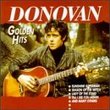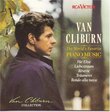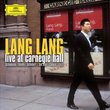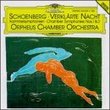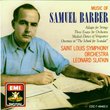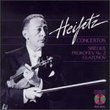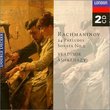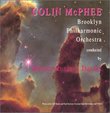| All Artists: Bela Bartok, Leonard Bernstein, New York Philharmonic Title: Bartok: Concerto for orchestra Members Wishing: 0 Total Copies: 0 Label: Sony Release Date: 11/24/1998 Genre: Classical Styles: Forms & Genres, Concertos, Historical Periods, Modern, 20th, & 21st Century, Symphonies Number of Discs: 1 SwapaCD Credits: 1 UPCs: 074646073025, 074646073025, 074646073025, 074646073025 |
Search - Bela Bartok, Leonard Bernstein, New York Philharmonic :: Bartok: Concerto for orchestra
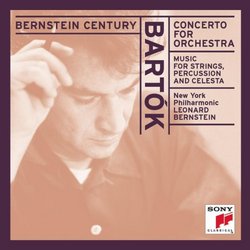 | Bela Bartok, Leonard Bernstein, New York Philharmonic Bartok: Concerto for orchestra Genre: Classical
The 1959 Concerto for Orchestra was one of Bernstein's first recordings as music director of the New York Philharmonic. It's still worthy of comparison with the classic 1954 Reiner recording considered standard by most cri... more » |
Larger Image |
CD DetailsSynopsis
Amazon.com The 1959 Concerto for Orchestra was one of Bernstein's first recordings as music director of the New York Philharmonic. It's still worthy of comparison with the classic 1954 Reiner recording considered standard by most critics. Bernstein gets the orchestra inside the music, expressing the range of Bartók's emotional world from the spookily mysterious opening to the hilarity of the intermezzo to the joyous finale. This performance makes the piece sound less conservative than it sometimes does--a decided plus. The orchestra plays extremely well, with fine work from its legendary first-chair players. Music for Strings, Percussion, and Cello, recorded two years later, is similarly effective. This coupling was previously available in a "Royal Edition," and if you have that, you don't need to replace it. But this latest mastering sounds fine for its age. --Leslie Gerber Similarly Requested CDs
|
CD ReviewsGenerally Unconvicing, But a Nice Coupling Paul Frandano | Reston, Va. USA | 12/25/2001 (3 out of 5 stars) "If you don't listen to, and review, serious music for a living, comparing and contrasting tens of versions of each major composition--and how many can do that?--you invariably lock into your favorite recording of any giving piece. This tends to "groove" your ears and musical soul. For almost 50 years, the gold standard for this Concerto has been Reiner and the Chicago, and for listeners of my age--I've had the Reiner for 30 years--we have worn our vinyl RCAs flat in our love for this music. Reiner was Bartok's friend from their student in Budapest and later became the powerful proponent--and authoritative interpreter--of Bartok's work. One thing jazz musicians who cross over into classical music (Benny Goodman, Wynton Marsalis), or vice versa (Andre Previn), teach us is that, for ANY music, Ellington has the last word: "It don't mean a thing if it ain't got that swing." All great conductors swing. (Listen to how Reiner swings this concerto, or John Barbirolli swings--yes, swings--the Mahler 9th, and your ears will change forever.) Bernstein, who knew jazz idiom intimately, almost intuitively, usually swings with the best. But in this early recording, he mostly plods, with a metronomic mediocrity that defies any expectation. Bernstein had clearly listened to, and adopted aspects of, Reiner's authoritative version--in passages of the first and fifth movement, tempi and section articulation seem to duplicate Reiner's, note for note. (I have a recollection, which I cannot document, that Reiner played the Concero according to, or very close to, the timings expressly prescribed by the meticulous Bartok.) I recognize that the flaw may be my ears and what they're accustomed to, but for me, with few exceptions, the Bernstein drags throughout and, as such, sounds lackluster and ponderous. The main exception is in the presto finale, which is played at an absolutely blistering pace and is quite stirring. As I listened, I imagined the bows of the string players beginning to smoke, then bursting into flames, then entire string sections igniting. That hot. These are Bernstein's most impressive moments on this disc--and he also brings the orchestra nicely to a crescendo, always a strongpoint for melodramatic Lenny.The Music for Strings, Percussion, and Celeste is a packaging bonus, however, which in the era of the CD, has become the standard coupling for the Concerto. The Music for Strings is played, to my mind and ears, to a much higher standard. In all, however, I would pass on this CD and opt for the Reiner. Even if you're collecting Bartok, many superior recordings (particularly if you do not HAVE to have digital) of this music--including the Antal Dorati and Ferenc Fricsay--remain in the catalogue at a low budget price." Bartok and Bernstein herman joseph | NY, NY United States | 05/22/2001 (5 out of 5 stars) "Bernstein was a great Bartok conductor. The music sizzles and becomes alive with an intensity that grips the listener. These towering monuments of 20th music by one of the greatest composers of the millenium are conducted with a wide range of expression, color, and emotional power by one of the great condutors of the century-- This CD is a must for the serious listener." A composer Bernstein forgot, but plays beautifully here Santa Fe Listener | Santa Fe, NM USA | 12/18/2005 (5 out of 5 stars) "It's odd that Bernstein, a champion of tonal modernism, didn't feel closer to Bartok. In his later career, after the mid-Sixties, he recorded nothing of his music. These two rollicking recordings from 1959 (Concerto for Orchestra) and 1961 (Music for Strings, Percussion, and Celesta) are more heart-on-sleeve than any other I've heard. The often elusive emotions and cool distancing one feels in the Concerto for Orchestra, usually played for shallow virtuosity, here turn into fiery extroversion, wit, and bumptiousness. The piece becomes first cousin to Petrushka. The NY Phil. sounds glorious and committed; the sonics are only limited in the loudest climaxes, when things get a bit screechy. Bartok didn't want to be held close to anyone's bosom, but if you want to anyway, this is the performance for you. (One wonders, by the way, if the young LB was present when his mentor Koussevitzky premiered the work in Boston.)
The MFSP&C is an intricate puzzle piece that benefits from precise, even analytical conducting a la Boulez. Bernstein has no interest in that--the opening hollow tones of the strings in canon are romantically shaped for eerie loneliness. The two fast movement are played with thrilling extroversion, the paino quite close and the percussion flailing away. You'd have to have a heart of stone to resist--although the composer might well have." |

 Track Listings (9) - Disc #1
Track Listings (9) - Disc #1